The Ark of the Code
This is from a (slightly edited) MS Word document that was written to accompany an artifact.1,2,4 The artifact is a wooden box ("ark") containing 15 sticks of (mostly) wood. Each stick corresponds to a point of the Code of Honor, and is described on an accompanying sheet of paper.3
Contents
Never Engage in Battles With Weaker Opponents
First Tenet of the Code
Commitment Before Ego
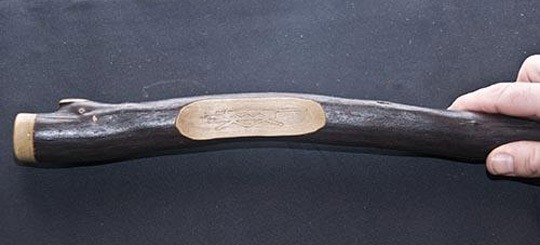
Manzanita
Wood: Manzanita — A strong hearty tree that grows in some of the most barren environments. Where other things have difficulty surviving, Manzanitas continue to grow and branch outward.
Symbol: Coyote — In Native American mythology, the Coyote is the trickster, the clever one who often tricks himself with his own cleverness.
To be successful, a man must possess a strong and healthy ego. However, a man's ego can consume him if he is not the master of it. A man without a clear sense of his commitment will allow himself to be led by whatever happens to be at hand in the moment (usually his feelings or his ego). Commitment before Ego demands two disciplines:
- To practice and possess a firm understanding and adherence to one's purpose and commitment; and,
- To hold an iron mastery over one's ego.
Many people equate commitment to making a pledge or promise to do something. Actually commitment is action. Commitment shows up not in what we say in the passion of a moment or even the things we do when spurred on by others or when things are going well. The benchmark of your commitment is evidenced by your actions when the underlying reasons behind your words seem challenged. When you no longer wish to be held to what you said. When there appears to be no reward for following through. When quitting looks like an attractive option. This is where the Ego has fertile ground to play its tricks.
There are many definitions and theories about the ego. Although Native Americans embody it in the form of a Coyote, it is more elusive than that. It is usually easier for others to see Ego governing our actions than it is for us.
This tenet is not Commitment over Ego. It is Commitment Before Ego. By that we mean let your commitment lead your ego rather than the other way around. The need to look good is Ego before commitment. The desire to do good is Commitment before ego.
2nd Tenet of the Code
Honor the Truth
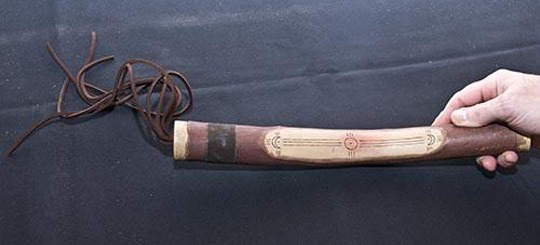
Madrone
Wood: Madrone — Madrone trees grow on hillsides, intermingled with many other species of tree. They do not dominate their environment and from a distance are unremarkable. They are easily overlooked. But on closer inspection, their bark gives away a hint of the rich beautiful wood that lies within.
Symbol: Sun & Moon — These are universal symbols of light. The sun projects the light and the moon reflects it. Without the moon's reflection there would be no evidence of the sun's presence. For this reason Zen Buddhism considers the moon to be the symbol of enlightment for it captures the light and sends it outward.
This tenet demands you to ask a simple question, Why am I here?
From there the questions peel away like an onion.
What do I hope to get? What do I hope to give? Who do you hope to satisfy by being here? What do you really really want?
What is the truth? Is it the same for everyone? If you don't know what it is, how do you honor it?
The search for truth lies at the heart of every religion and drives every philosophical construct.
Buddhist say that when you perceive truth, all else drops away, ego vanishes and there is nothing more than that moment. A passage of the New Testament of the Bible says, "You shall know the truth and the truth shall set you free."
All of us have experienced moments when the TRUTH about something has been revealed to us. We know it not because it resonates in our head but because it resonates with our heart, our soul. Suddenly we feel enveloped with a sense of clarity and for the moment we have a feeling of exhilaration and freedom. Everything falls into place and you see things with a new perspective.
This tenet does not say "Tell the truth," rather it says honor it.
Sometimes it is better to hold the truth in your heart than to reveal it to someone who might not be ready to face it.
For example, when you hear the question, "Honey, do I look fat in this dress?"
So when do you speak the truth? Such moments cannot be forced or manufactured. If we suddenly declared, "It is time to honor the truth." Each of us would unconsciously or maybe even consciously start erecting internal mazes that would make it exceedingly difficult to get to the truth.
What we can do though is to create an environment that fosters respect for sincerity, honor and genuineness. To create such an environment is a challenge. In such an environment there is an opportunity to learn something. To learn the truth about you as a man and as a human being. When you come to that truth and own the truth and honor it, then you have something to offer, other men will recognize it and they will be inspired by it. It might help them to discover a truth within themselves.
The only truth you can really know is your own truth, what lies within you.
3rd Tenet of the Code
Respect Confidentiality
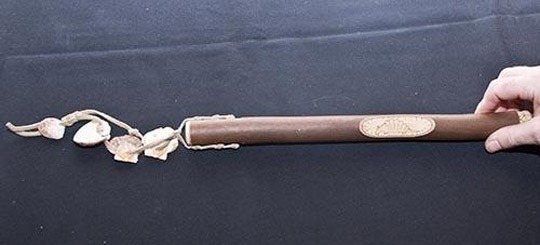
Eucalyptus
Wood: Eucalyptus — The eucalyptus tree is usually found growing in groups. Its outer bark is shed easily, but gives nothing away. Its inner bark is strong and not easily stripped away. The strong aroma that is the true gift of this tree is safely encased within the inner bark.
Symbol: Armadillo — In some Native American traditions, the armadillo is a symbol of boundaries. To protect itself, the armadillo will roll itself into a ball protected by its outer shell.
Definitions:
confidential — indicating confidence or intimacy.
respect — to hold in esteem or honor.
This tenet does not say enforce confidentiality but rather honor it. The tenet does not ask that we keep secrets or remain secretive. We often say "you are encouraged to take the lessons learned here and to share them with the men and women in your life". Simply this tenet asks that men respect the intimacy created amongst men who come together for a common purpose. Intimate circles allow men to feel safe, safe to let down their guard, to be vulnerable and to honor their truth. During times of war, soldiers were reminded, "Loose lips sink ships". Likewise, the bond of intimacy is a delicate one, which can be shattered by a thoughtless indiscretion. The bonds of trust are delicate. They can be likened to flames on a candle. When guarded and sheltered from an errant wind, they burn bright and can light a room. However, the flame is easily extinguished in that moment when our guard is dropped. There is a deep power you can access each time you draw a line and stop your mouth just when you were about to run it and make a conscious decision to honor the sanctity of a sacred space.
To ensure that each man here respects this space we ask that everyone agree to hold what you see and hear here as confidential.
4th Tenet of the Code
Keep Your Word
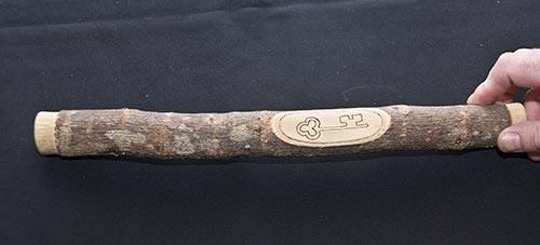
Fig
Wood: Fig. The fig tree is mentioned in some of the most ancient of text. The Bible, the Koran, the Book of Buddha. Even in the most inhospitable of climates it always fulfills its promise of providing an abundance of fruit.
Symbol: A Key — The key symbolizes a promise to unlock and make available something that has been placed in trust for safe keeping... but only when asked. A man's word is the key to manifesting his power.
Keep your word simply means that one ensures that his actions are consistent with his words. Every man understands the importance of this tenet and can easily articulate what it means. Yet each of us has failed to uphold this tenet from time to time. Why do each of us sometimes fail to keep our words, even when we had every intention of honoring them when we spoke?
All we have as we stand here together are the bonds and agreements created by our words and re-enforced by our deeds. Your word is the public expression of who you are and the sacred essence of what you will stand for. It is YOUR word; it belongs to you and can only be co-opted if you permit it. To live a powerful, meaningful life you must be willing to give your word in trust to others and to hold the words of others in kind.
Choose your words wisely and be prepared to stand behind them.
Say what you mean and mean what you say.
5th Tenet of the Code
Be A Three5 Dimensional Man
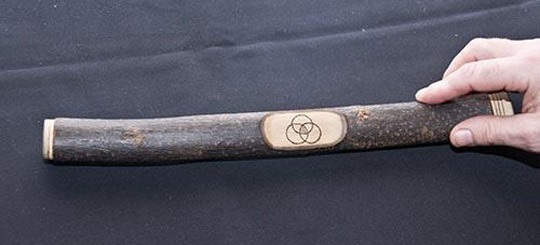
Walnut
Wood: Walnut — The walnut tree gives on many different levels. It is a strong wood, used to construct sturdy and dependable furniture and shelter, it also provides clean burning aromatic firewood and has been used by Native Americans to conjure the spirit and of course the tree produces lots of walnuts a valuable source of rich nourishment if you can break through the hard shell.
Symbol: Three interlocking rings. The rings represent the three dimensions of a successful man each intertwined and inseparable from the others. The center, where they intersect reflects a place of balance and full strength.
In The Men's Division we strive to be multi-dimensional men. One example of a three-dimensional man is illustrated in the Men's Weekend: one part Clint Eastwood, one part Mohandas Gandhi, and one part Curly Howard (of the Three Stooges). We believe these three men embody the three aspects of manhood necessary to be a well-rounded man. Clint embodies the unshakeable ego that strengthens our resolve to grab our balls, trust our gut and get the job done. Gandhi embodies the spirit that connects us to one another and provides the resolve to endure great pain to obtain a higher purpose. Curly embodies the wisdom of a man who can laugh at himself and is indifferent to how others view him, allowing him to be true to himself. Simply put, to succeed, a man must have depth and should strive to be well rounded and learn to access a variety of tools within his "tool belt".
Few men succeed in maintaining a balance amongst their many dimensions. And many men struggle to embrace a dimension that is just not within them. It is hard to imagine Curly on a hunger strike, Gandhi imploring some punk to, "make my day" or Clint doing the Curly shuffle. And therein lies the challenge. Identify the dimension that represents your strength and draw from those men who embody the dimensions that are your weakest to learn other ways of being. It is usually not hard to spot these men; you have probably already identified them in this circle. They are the men who push your buttons. Whose priorities make no sense to you, whose way of being is foreign to you and uncomfortable for you to embrace. These are the men who have the most to offer you and for you to give to them. To work in harmony with these men is to be at the intersection of the three circles, to be at the heart of masculine power.
Note that by 2011 this one changed to Be Three-Dimensional; see this discussion of variants.
6th Tenet of the Code
Be Prepared
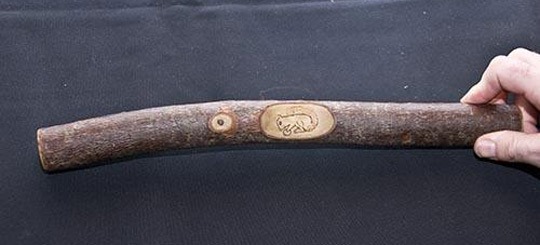
Pine
Wood: Pine — Pine trees are prepared for every element. They are flexible enough to sway in strong winds. Their branches can sag to the ground with ice and snow without breaking and bounce back with resiliency with the thaw. Their sap cools in summer and warms in winter. They stand ever green, always prepared.
Symbol: Squirrel who gathers nuts to prepare for a hard winter ahead.
The saying, "Be Prepared" has been popularized by the Boy Scouts. Imagine a young scout marching off to the woods for his first overnight. He has his compass, his tent, his sleeping bag, knife, and poncho. He is ready for anything the physical elements may throw at him. He knows first aid and knows how to signal for help if he is in trouble. He can care for his physical well being. This level of preparation is important. It is good to anticipate what the elements may throw at you and be ready to answer in kind. This level of preparation helps us succeed in our jobs and at many daily tasks.
However, there is another level of preparation. It is the level within. Will all the tools and tricks help that boy scout deal with the emotions of his first night away from home. Has he been prepared for that? Are you prepared for the unexpected? Can you be?
Men live their lives in relationship with others. To the degree that a man lives his life unprepared, his actions have a negative impact on those around him. In order to be honorable, a man must discipline himself to anticipate life's challenges and be prepared to deal with them. Only then can a man claim personal honor and responsibility for himself and those around him.
7th Tenet of the Code
Defend Humanity
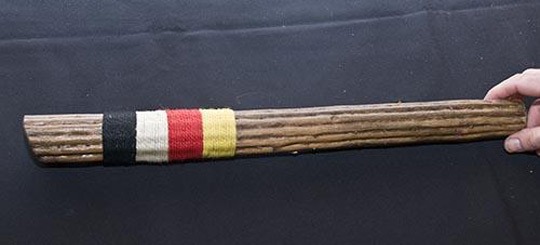
Cactus
Wood: Rain stick — Cactus — Many indigenous people use the rain stick to call forth rain when there is drought or the grandfather spirits when men of the tribe suffer from an emotional drought or crisis of faith.
Symbol: The colored bands represent the colors of man. Yellow, red, black and white, they reflect all humanity.
Definition:
to defend — to take a stand in support of something without regard to the cost.
There are at least two levels to this tenet. One is to take a stand for all humankind. To strive for a higher purpose, something larger than oneself. This may seem daunting to some because you may ask, "how can one person change the world?" But in truth the world changes every second because of the acts of millions of people acting alone. The challenge is in helping each of those individuals to find the higher purpose that allows their actions to move in harmony rather than conflict. Sometimes striving for a higher purpose may seem easy because are aiming at a large target. But pursuing such a goal requires a long-term commitment to excellence and consistency because to achieve something beyond you, you must strive to be better than what you already are.
Another level is to take a stand for that which is humane in every man, that essence within each person that makes them distinct and unique. The definition of humane is "the best qualities of mankind — mercy, honor, compassion." To work at this level you must be tenacious enough to fight to bring out these qualities in every man you come in contact with and to trust that these qualities exist in every man.
However you hold the tenet it still requires you to take a stand for something outside of yourself and to do so without regard to what is personally at stake for you.
8th Tenet of the Code
Always Be Faithful to the Men
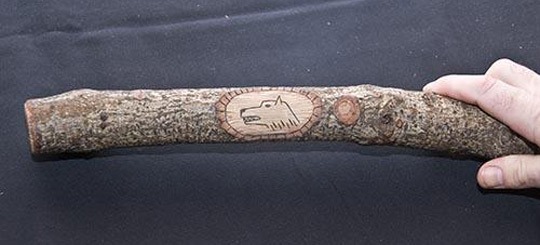
Oak
Wood: Oak — A tree of strength and steadfastedness. Something built of oak can be counted on to last a very long time.
Symbol: Dog — The dog is universally recognized, as a symbol of faithfulness, forever at the side of is master and companion.
Definition:
faithful — to be dutiful; loyal; worthy of trust; consistently reliable; consistent with the truth
This tenet can be tricky. Many men have mistakenly interpreted it to call for loyalty toward men at the expense of women. It is not about that. Many men have assumed it calls for unquestioning devotion to the men on your team. It does not. It is not about selling out a man by not challenging him in the hope that he won't challenge you. Rather it should be held in the spirit of being committed to the greatness that resides within every man.
To have trust that that greatness is there.
To dutifully strive to bring it out.
To loyally follow a Code of Honor that allows it to flourish.
We must teach faithfulness by being consistently reliable and consistent with our truth. Being faithful means seeing a man's greatness when he cannot see it in himself.
This tenet can be interpreted as not quitting on another man.
9th Tenet of the Code
Defend A6 Code
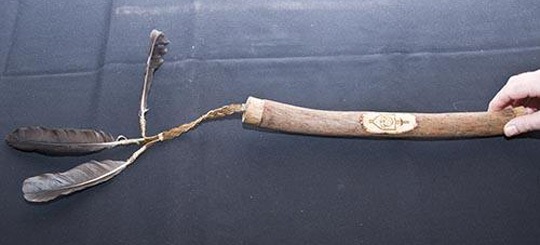
Cedar
Wood: Cedar — Cedar represents purification. It is used in rituals designed to get close to the pure source. As an evergreen, cedar is resistant to the elements and is durable; it stands the test of time.
Symbol: The shield emblem of the Sterling Institute of Relationship — The Sterling Institute is the example of an organization that has been instrumental in bringing men together for a common purpose to embrace a common vision. That vision is reflected in the Men's Division Code of Honor.
This stick also bears three crow feathers. The crow in Native American tradition is the "keeper of the law."
Definitions:
to defend — to take a stand for something without regard to the personal cost.
code — a set of accepted rules and regulations that are applied to a specific set of circumstances.
Living by a code should not be mistaken with honoring one's terms. Terms are personal. Each man must determine where his line in the sand is and then stake it out as his terms from which he commits not to waiver.
A code however represents a shared agreement. By agreeing to defend a code, any code, you make an agreement with many others to adhere to a set of rules and ways of being that you can each be counted on to fight for.
A code is a unifying force that empowers men to apply their personal terms in the context of a higher vision that allows for a level playing field. It becomes the unspoken "truth" that allows men to know what ways of being and actions others can be counted on for.
In order to defend the code, one must:
- Understand the value of having a code of honor in a man's life
- Keep the code (and its value) alive by living it, teaching it and calling out those who are not living it in order to help them reclaim their honor
10th Tenet of the Code
Never Engage in Battles With Weaker Opponents
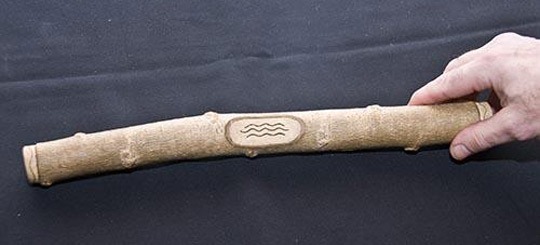
Cottonwood
Wood: Cottonwood — The trunk of the cottonwood is used in the Lakota Sioux' sacred Sun Dance ceremony. In the Sun Dance, the Lakota warrior relinquishes any battles he has with weaker opponent and takes on the strongest of all foes, his own fears, as a sacrifice to his people.
Symbol: Water — One of the most receptive of all elements, water will take on solid rock as its opponent and with persistence, eventually wear it away to nothing.
Definitions — The dictionary has no less than 18 different variables under the word weak. Suffice it to say that the definitions are broad enough to cover virtually any type of opponent.
On the surface the logic behind this tenet is simple. There is no honor in battle, whether you win or lose if your opponent is obviously weaker than you. But what makes an opponent weaker? Children are obvious examples of weaker opponents in every sense of the word. But what about women? Obviously engaging in physical contact with a woman would violate this tenet, but what about a battle of wills? Is there really any honor in such a battle even if you were to win?
Therefore, ask yourself a question when you find yourself about to engage in a battle. Is this a worthy opponent? Is this someone who will make me stronger from the battle or am I merely engaged to satisfy my ego, quell my anger, and assert my power?
In many martial arts, combatants are trained to use the strength or weight of their opponents against them. In many strategic battles out manned troops will prevail by going directly into the stronghold of their enemy. Often where we feel the strongest we are most vulnerable. Because it is where we are the least vigilant.
Before you engage in any battle, look your opponent in the eye. Honor their strength, expose your weakness, and then let the games begin.
11th Tenet of the Code
Fight Only Honorable Battles
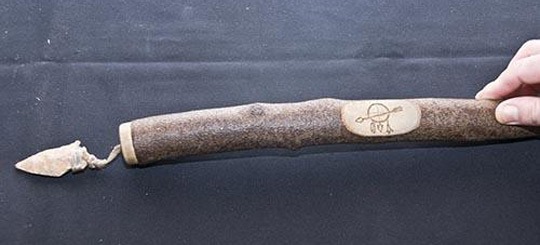
Laurel Bay
Wood: Laurel Bay — The leaves of the laurel tree were used to make laurel wreaths that the Romans used to decorate their men of honor. Upon returning from great conquests warriors were sent off to rest on their laurels and to take in the gifts of gratitude bestowed upon them from a thankful community.
Symbol: Spear and shield. These symbols of hand-to-hand combat reflect the purest form of combat. Hand to hand combat is considered the most honorable way to engage in battle because it requires combatants to come face to face and to depend on their individual skill and resolve rather than the quality or power of synthetic weapons. Often the victor in hand-to-hand combat is the man who wants it the most. The man who in his heart believes he has the most to fight for. Whose battle is the most honorable.
For many, the definition of battle is an armed engagement, a war. But a lesser definition defines battle as a conflict, a struggle. For example the conflicts and struggles we fight everyday with the demons and fears that lurk deep inside each of us.
Self-doubt, shame, anger. Taking on these emotions are the honorable battles we can fight each and every day. The honor lies in acknowledging these opponents, bringing them into the light and taking them on no matter how ugly it looks. The battle becomes honorable when you turn to other and ask for their help. Chances are that if you find yourself fighting a battle alone, it is because you are fighting to protect your ego or some personal agenda. By fighting an honorable battle together we strengthen our relationships and build a foundation for a stronger and healthier community.
In order to live one's life fighting only honorable battles, one must:
- Understand what there is that's worth fighting for
- Understand what is not worth fighting for
- Have enough mastery over one's ego to never fight battles in defense of one's ego
12th Tenet of the Code
Earn and Honor Rank
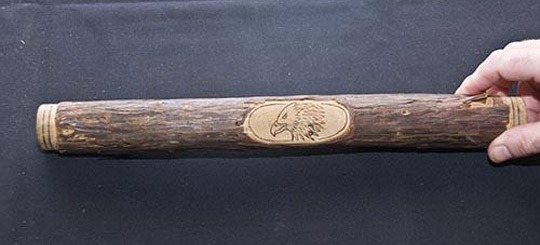
Redwood
Wood: Redwood — The redwood tree is the grandfather of trees. He stands tall and straight, above all others. He is long lived and considered wise. Redwoods attain a stature unparrelled by any other living thing.
Symbol: Eagle — A universal symbol of leadership. The eagle soars high where he can oversee his domain and easily swoop low to the ground to gather what he needs.
There are at least two ways to view this tenet. One is the militaristic notion of following the chain of command. Do what you are told and only what you are told. Don't question authority. Follow your orders. Is it sounding scary yet?
For any entity to survive there needs to be some semblance of order, there does not, however, need to be blind unquestioning devotion. If there were, you'd have a cult. Here are some definitions:
Definitions:
earn — to acquire through service
honor — to respect greatly and hold in high esteem.
rank — a series of things in a line; a degree of dignity, eminence.
These definitions allow us to embrace another way to look at this tenet.
Find your place in the legacy of men.
Each of us is part of a legacy. There are men who have come before us and there will be those who come after. Where do we fit it in? Will you be remembered as someone who gave or someone who took? Earn your place here now and honor those who have created the space you now stand in.
13th Tenet of the Code
Be Humble
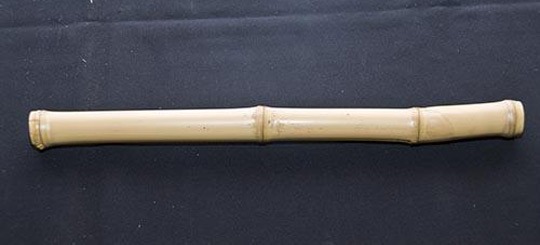
Bamboo
Wood: Bamboo — Bamboo is a grass and grows like a weed wherever it takes root. One shoot is virtually indistinguishable from the next. Yet it demonstrates incredible strength and versatility in its uses.
Symbol: Appropriately there are no symbols or markings on this stick.
Many men think being humble means being submissive or putting yourself down. It means just the opposite. To have humility is to be strong enough to rise above the needs of your ego. To have such a strong enough sense of self that you need not feel compelled to prove yourself or have your words win the day.
Humility is the opposite of the Ego. The ego is the natural enemy of relationship. When you are humble there is room for you to respect others and the world around you. In that space you can see just how much there is to learn. It is to appreciate, as Earl Weaver once said that, "The smarter I get the more I realize how much I don't know."
To be humble you must embrace what Zen Buddhists call a "beginner's mind". The student of such a practice approaches everything as if it is new, as if it is being seen and experienced for the first time. It is all new. Every aspect is fascinating and unknown. Every facet contains new information and new experiences. Since you do not already know how to do something, you must allow yourself to be taught by the experience. There is an opportunity to grow and to gain energy from the excitement of stepping into the unknown. It is to avoid the temptation to relate to others by saying, "I've done that" or "I know what you mean" or thinking that you know what is in another's mind.
To be humble is to approach everything and everyone in your life with a beginner's mind.
14th Tenet of the Code
Embrace All Men
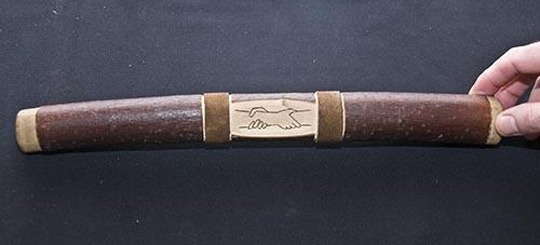
Willow
Wood: Willow — Willow is known for its flexibility. It is used in the structure of the sweat lodge which itself symbolizes the womb which embraces and nurtures. Willow is a rare wood in that if it is severed from the tree it will regenerate itself if soaked in water and properly nurtured.
Symbol: Men's arms embracing in the secure grasp of one another's wrist. This grip is often referred to as the life saving grasp.
Definition:
embrace — to clasp or hold in one's arms as a sign of affection; to encircle or surround; to include within one's bounds; to accept eagerly; to take in with the eyes or mind; to submit to with dignity and fortitude.
Embrace ALL Men — Sounds like a big job. Yet we each have done it. In our initiation weekends we had a chance to stand within a circle of men, many of whom we did not know their name or life story, yet we were prepared to take them in for who they were at that moment. We are here now because during our initiation we discovered the power of embracing all men. We discovered our commonality. The shared wounds, common dreams and struggles. No matter how different we may look on the outside, when you strip us down we are really very similar.
To engage in an embrace one must let his guard down. A man is never more vulnerable than the moment before an embrace is completed. In that instant there is complete trust between two men that each will follow through in the unspoken promise to complete the embrace. It is why the actual embrace feels so good. Hold it, feel the connection. Its power can be frightening and uncomfortable. Often times we don't like to acknowledge just how much we actually share. Often we are surprised to realize how little we need to say to communicate what we feel.
To live this tenet open your arms to the warts and strengths of the men in your circle and consider when a man reveals something about himself that "you are that man".
Final Tenet of the Code
Be An Example to Children
{no picture available}
Wood: Olive — The olive tree represents youth, vigor and nurturing and the olive branch is often offered as a symbolic offering of peace. In the bible, following the great flood, Noah sent out a dove. The dove returned with a leaf from an olive tree representing rebirth and a world born anew. The bark of the tree is very green and it remains green and soft long after it is cut giving the impression that is forever youthful and never fully matured
Symbol: Heart within a heart. The strong heart of a man must protect, teach and feed the tender, developing heart of the child.
This is the last of the tenets of the code. It comes last not because it is the least important but because it encompasses everything that comes before it. For in everything we do we are setting the tone for future generations. Children are sponges, they easily and quickly absorb everything they see and hear. They are quick to mimic our conduct. If we provide the example of honoring the truth, our children will understand the value of leading their life with integrity. If we respect confidentiality, our children are less likely to find power in gossip. If we embrace all men and defend humanity our children are more likely to find comfort in inclusion rather than false power from exclusion.
In the Book of Proverbs from the Old Testament there is a passage that says, "start a boy on the right road, and even in old age he will not leave it." How often do we bring back vivid memories from our childhood? Close your eyes and think back as far as you can. Possibly as far back as when you were five or four or even three. Your mind will settle on a moment, a memory. Now think how often that moment impacted upon you in later years. Did it model conduct for you? Did it provide a place of comfort? Or does it bring upon a sense of fear and ill ease?
As we stand here today, we have the power to forge the path of the future and to carry the wisdom of the men who came before us by being an example for children. There are three ways a man can leave a legacy. By the children he sires — by passing on his DNA. By the things he builds — passing on his material wealth. Or by the people he touches throughout his life by sharing his wisdom. Of the three, the third can be the most profound and far-reaching and can often extend well beyond our expectations because we never know who is watching or who is listening. The examples we are are our legacy, cherish and protect it.
Appendix A
The Code of Honor as Memetic Culture
by Robert Munafo
The Code of Honor has spread as widely as the culture of men's teams that came out of Justin Sterling, Peter Rosomoff and the original Men's Division organizations. Few men who use it realize how widespread it has become. Its widespread use is evident from the variety of web pages that are returned from putting a few of its tenets as quoted phrases in a Google search.
One writer joined a tribe.net group, wrote the following in December 2003, and later unsubscribed (making his identity unknowable). It typifies the orientation that typical men's team members have towards the Code of Honor:
Well, the circle I participate does have healing the split as one of our goals, though it isn't our primary focus, and is stated in our core values a little differently: "We are men women can trust." Several of the values in our code of honor also could be related back to the issue of healing the split. Below is our code, with some comments about what I think each item means. It's written with the words from the code before the : and the words I've added after.
Code of Honor
Commitment Before Ego: Doing what you said you would do and what you are commited to should have higher priority than what you want to do in any given instance.
Honor The Truth: Listen to and take in the truth about yourself as others see it, and also give the truth to the other men. Don't sell other men out by sugar-coating things or not saying something at all because it "isn't nice."
Respect Confidentiality: Whatever is said or done in the circle stays in the circle.
Keep Your Word: Do what you said you would do. This extends also to one's ideals and higher purpose. Do what is aligned with these.
Be a Three-Dimensional Man: Honor and express all aspects of yourself. Don't let your personality be unbalanced. Express your rage, your love for humanity, your love for family, your sense of humor, your sense of justice, etc. Let these things be balanced, and don't go too far in one direction at the expense of other aspects of yourself.
Be Prepared: This is kind of like the old boy scouts motto. Always have everything you need for a given situation. When you know what you need, make sure you bring it. When you don't know what you need, attempt to anticipate it and bring it with you.
Defend Humanity: Come to the aid of those who need it when you're able to provide it. Break up fights when possible.
Always Be Faithful To The Men: Don't sell out men in the circle, and don't abandon them when they need you. The men are a commitment, and come before your own wants and desires.
Defend The Code: Hold men accountable to living up to this code. Call them on it when they slip up. Bring to their attention the ways they are selling themselves or others out.
Never Engage In Battles With Weaker Opponents: Just what it says. Don't do battle with those who are not equipped to fight back at the same level as you. This includes things like not backstabbing an employee at work if you are over him in the chain of command, or not picking a physical fight with a person smaller than yourself.
Fight Only Honorable Battles: Just what it says. If a battle is about my wants and my needs instead of what I'm committed to, then it's not honorable.
Earn And Honor Rank: The men will follow a leader, and will elect a leader when he earns that leadership by demonstrating his ability. Honor the rank above you and below you, but also honor the rank you hold for yourself.
Be Humble: Recognize that, like everyone else, you are just another jerk on the bus. As Tyler Durden says in Fight Club, "Listen up, maggots. You are not special. You are not a beautiful or unique snowflake. We are the same decaying organic matter organic as everyone else. We are the all-singing, all-dancing crap of the world. We are all part of the same compost heap."
Embrace All Men: Recognize and acknowledge yourself in every man you meet. Invite any man you know to join the circle. Help any man in your life, and apply this code of honor with him. Treat men outside the circle as if they were inside the circle.
Be An Example To Children: When children are around do only those things you wish them to emulate. Don't use bad language, don't break the code, don't let them see or hear anything you don't want them to do.
I didn't specifically comment on which items I think are about healing the split, but I think almost any of them could be applied in that way. The code is like an ideal, and we don't always live up to it. What's important is to clean things up when you f*ck up, cause we all f*ck up from time to time. It's also important to f*ck up less as time goes on. If you find yourself f*cking up more and more often, you're not really living the code.
(This is from tribe.net. Their terms of service, section 11, reserves proprietary rights but also notes, "The foregoing does not apply to user content.")
Note in particular that this writer captures some of the meaning of each tenet but usually not all of that described above. I have found that teams and larger groups of men typically retain the entirety of the culture, even if they seldom speak of it.
Footnotes
1 : I first saw this artifact in 1996 January. At the time, Rick Thimble said that: he had only seen it once since it was created, (by some men in the California Bay Area), and it was "already" being given to a new Region, i.e. New England. Therefore I would guess it was made sometime in 1995 (and possibly beginning the project late in 1994), and had taken turns being kept by each of the Men's Divisions in the Bay area, probably for about a month each.
Small amounts of editing of the text are apparent, for example we see "MDI" and a "multi-dimensional man" discussion in tenet 5. However, I recognize most of the text as original.
— Robert Munafo, 2008 April 21st
2 : The Code of Honor was created by the men of what was then known as the Sterling Men's Divisions. It was intended to reflect some very basic core values that all men could rally behind and support.
Back in the late 1990s the men of the Western Region created an ark which contained 15 different pieces of word. Each stick was made of a specific type of wood and bore a specific design that reflected the way in which the men of the Western Region related to the tenets of the Code of Honor. The ark has made its way throughout North America and men throughout MDI have had the opportunity to connect with it. I had the honor serving as the caretaker for the ark and was moved to write a bit on how I related to the Code.
— Howard Spierer, 2008 November 2nd. (This text is Copyright © 2008 Howard Spierer - Man-up. All rights reserved.)
As suggested by the above, Mr. Spierer expanded upon a number of the essays on the tenets of the Code of Honor. For a while some of those essays were at howardspierer.com/man-up/?cat=9.
3 : This material was made available in Microsoft Word format on the website of the Southwest region of MDI, sdmensdivision.com. That version most closely matched the original sheets of paper in the Ark.
4 : For some time a more recent version of Spierer's commentary was published on the (public section of the) official MDI website, at www.mdisuccess.com/code-of-conduct/, now no longer available. The "newer version" links at the end of each tenet description take you to an archived copy of the "mdisuccess" version.
5 : "Three-Dimesional Man", as described by tbe essay (with the evocation Gandhi, Curly, and Clint) comes out of the Sterling Men's Weekend. This particular tenet is the one most often changed, perhaps to avoid dependence on the specifics of the SMW or its three personality archetypes.
One man who quoted the Code of Honor in 1996 simply added three parenthesized words after the 5th tenet: "(Caring, Fun and Courageous)".
The writer quoted in Appendix A, (in 2003) did not change the tenet or define its three dimensions, but did go to some effort to list several different aspects of mature masculine character.
In another alternate form, the 5th tenet reads "Be a Four-Dimensional Man". The four dimensions refer to the four archetypes of mature masculine character identified by Carl Jung and described fully by Robert Moore and Douglas Gillette: the Warrior, the Lover, the Magician and the King. As such, we can clearly see the Lover and the Warrior in Gandhi and Clint respectively, but Curly is represented only by subtle implication: a combination of surprise brought by the Magician with joy brought by the King.
The 2008 book Finding Our Fire - Enhancing Men's Connection to Heart, Passion and Strength By Martin Brossman, includes the Code of Honor on page 168 in a quotation from an MDI member. There, the 5th tenet is "Be a multi-dimensional man".
6 : "Defend A Code" is an alternate form of the 9th tenet; the original and more commonly encountered wording is "Defend The Code". The text above explains why the author(s) thought "a" was better — however they were not completely of one mind, as evidenced by a return to "the" in the final few sentences.
7 : Though Spierer reports "late 1990s", as described above1 I saw the ark in early 1996 having been fully created and held in the Bay area for at least a half-year, thus "mid-1990s" seems more accurate.
Further Reading
Howard Spierer set up a blog at howardspierer.com/man-up, now no longer accessible.
Unlike most other pages on this website, the material on this page has
NOT been made available under a Creative Commons license. For
guidance on the use of this material, contact Howard Spierer, or one
of the elders in the Southwest or Western region of MDI.